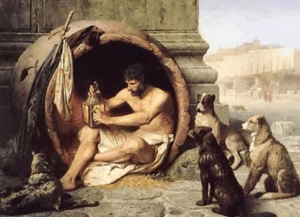 The word Cynical first applied to the Greek philosopher Diogenes who was born in Sinope and who lived and acted unconventionally in order to expose the falseness of modern conventions.
The word Cynical first applied to the Greek philosopher Diogenes who was born in Sinope and who lived and acted unconventionally in order to expose the falseness of modern conventions.
He was some boy was Diogenes, exiled from Sinope for defacing the currency of the time, possibly encouraged to do so by the Oracle at Delphi.
Diogenes lived like a tramp, sleeping in a tub in the street, begging, going to the toilet unceremoniously when the urge required it. He also pleasured himself in public in the market square, observing he wished he could ease his hunger as easily by rubbing his stomach.
For those that would sling the word about with abandon, ‘Cynic’ is derived from the word ‘Kunikos’ which means ‘dog like’. Anyone who has a dog will know that it capable of many things. But fundamentally it acts on instinct.
I have a new dog. It hasn’t pleasured itself in the market place just yet, but its tongue certainly reaches the parts. One of the abiding principles of Cynicism is that if an act is not shameful in private, the same act is not made shameful by being performed in public.
Our man Diogenes when asked by Alexander the Great to name his one wish, replied pithily: “I wish you would stand out of my sunlight.’ He once went out and about in Athens in broad daylight carrying a lighted lamp seeking ‘one honest man.’ Such was his impact on Alexander, the Great man observed to an associate ‘If I weren’t Alexander, I wish I were Diogenes.’
In their approach they were certainly anarchic these Cynics. They avowed an ascetic lifestyle which they found necessary for moral excellence because it made them resistant to pleasure and pain.
Of late, the word cynical has been the most over used word in our lexicon. Cynical fouling. That is what a dog will do. And that indeed that is what Diogenes did. Physical activities without standing on ceremony. Take a crap. Take no crap. Makes no difference. Not a jot.
The Cynics preached the universal brotherhood of man, they were cosmopolitan and anarchic. Lived life their own way. Acted as they pleased. Their Cynical views unthinkable to other Greeks.
Antisthenes was a Cynic too, and teacher of Diogenes. He had witnessed the death of Socrates. Of other people casting their opinion he remarked: ‘It is better to fall in with crows than with flatterers; for in the one case you are devoured when dead and in the other case while alive.’
We’ll leave the last word to Diogenes the tub dwelling, public wanker and cynical fouler who had little time for sportsmen: ‘Why are athletes so stupid,’ he asked before replying to himself: ‘ Because they are built up of pork and beef.
Depending on who you talk to Diogenes died from either holding his own breath, being bitten by a dog or eating raw octopus. Take your pick.
Cynical or what.
